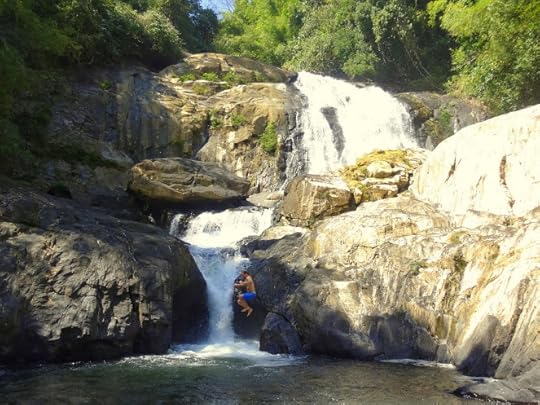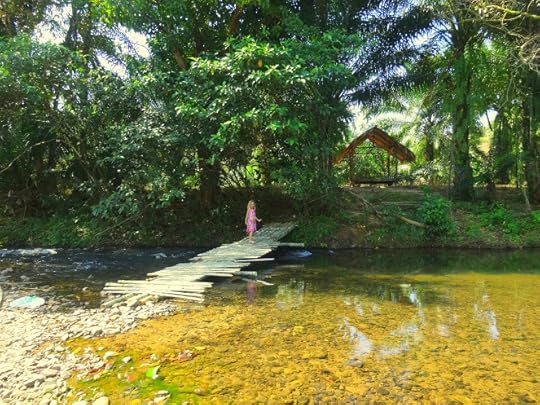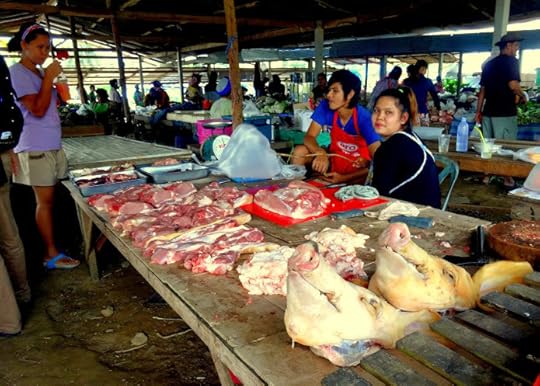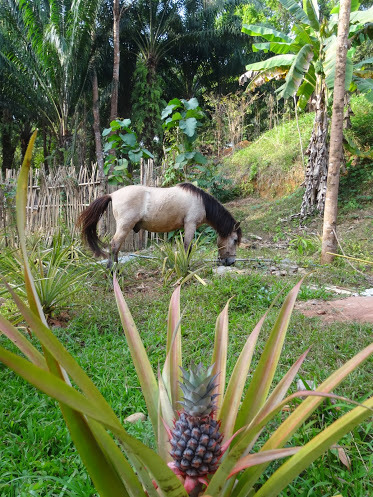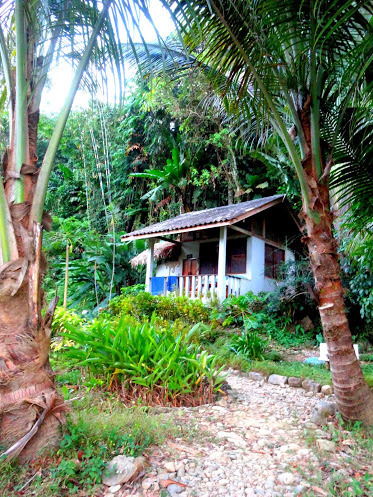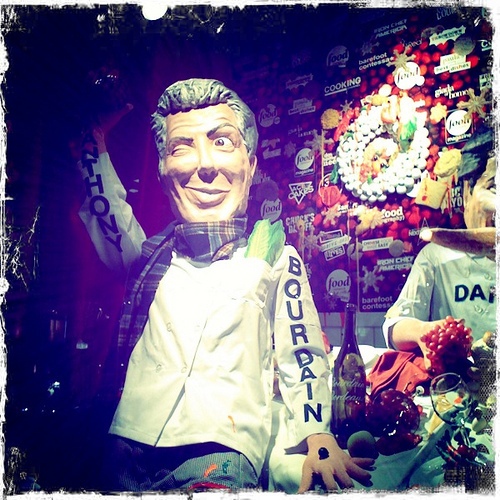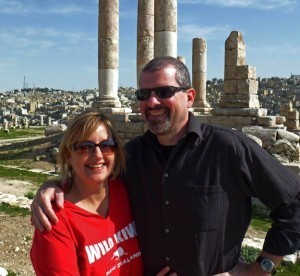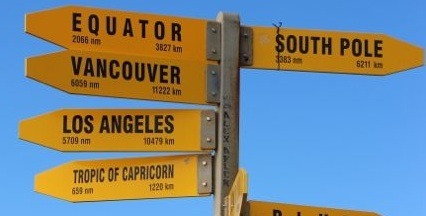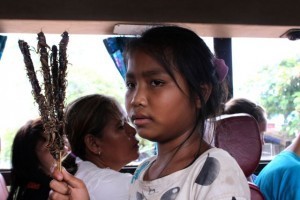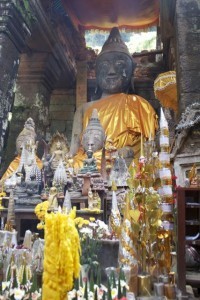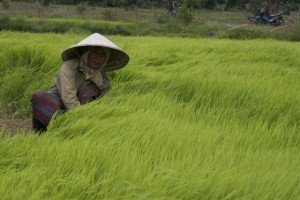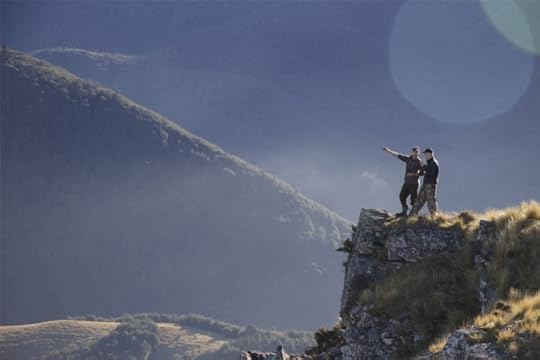Rolf Potts's Blog, page 47
March 4, 2014
Vagabonding Field Report: Two weeks in a Thai rain forest eco-lodge
Vagablogging :: Rolf Potts Vagabonding Blog
Cost/day:
$60-75/day including nearly all organic meals, outdoor adventures and lodging for three people. A single person or even couple could probably get away with around half of that by eating at local restaurants or finding a way to cook some meals.
What’s the strangest thing you’ve seen lately?
I hesitate to call it strange, but it was really interesting to see the cultivation of betle nut all around us. Intensely arduous work with some sort of pole tool is needed to harvest the nuts from the top of the tree. Seemingly every home had betle nut drying in various stages in the yard, from the just picked bright orange to the fully dried dull gray.
Once they got to the optimal point, entire families would sit around and remove the nut from the husk. The husks were then burned in piles in various locations throughout the yards and the nuts bagged in large sacks. It was truly a family affair.
Describe a typical day:
Waking up in a bed surrounded by a mosquito net to the sound of a small river nearby. Flipping open the laptop to do some work.
Later, we head up to the restaurant, where we have the option of Western or Thai food, all of which is organic and local. We engage in conversations about life and travel with other guests or volunteers.
We then head out to explore the area, maybe visit a school, hike to a waterfall, or take a bamboo raft down the Paksong River.
We come back in the evening and do some homeschooling and work, maybe at the lodge, maybe in our room, maybe in a random spot by the river. We maybe take a yoga class or mandala drawing workshop.
We head up to the lodge for dinner where we eat a buffet style meal of fresh Thai food with our new friends and talk and listen, hearing accents mostly from all over Europe. Some evenings people get out their instruments to play music and sing.
We head back down to the room, where the daily ritual of teeth brushing and bedtime reading ensues.
After our daughter falls asleep, my wife and I will talk until the symphony of frogs, geckos, insects and the river sends us to sleep.
Describe an interesting conversation you had with a local:
Probably the most memorable conversation I had was with some local boys. We first met them at their school when we visited for a few hours. We learned from them the very basics about their lives at home and school.
We were completely charmed by their excitement when, a few days later, they found us at a festival. They hugged us and flashed enormous smiles.
We sat around and talked a little more but with a very limited ability to communicate, we were all happy to just sit and share food and drinks with one another.
What do you like about where you are? Dislike?
I like that it’s peaceful, that I somehow feel at home, that there is great company, that the town isn’t overrun with tourists, that seemingly everyone smiles at us and that it is so stunningly beautiful. I honestly can’t think of one thing I disliked during our two weeks there.
Describe a challenge you faced:
Getting to and navigating through the local hospital so that my wife could get one of her series of rabies shots, which she needed because of a monkey bite.
What new lesson did you learn?
I wouldn’t say that I learned this lesson, but instead that I was reminded of one I already knew, which is that when I disconnect from the internet I am generally happier and more at peace. Being at the eco-lodge allowed me to disconnect from the computer for all purposes other than work and reminded me of this valuable yet often-forgotten lesson.
Where next?
We’re headed to Chiang Mai, Thailand for some city living.
Original article can be found here: Vagabonding Field Report: Two weeks in a Thai rain forest eco-lodge
March 3, 2014
Anthony Bourdain: On food and travel
Vagablogging :: Rolf Potts Vagabonding Blog
I have a confession to make: I’m falling in love with Anthony Bourdain.
After twelve years without a television to share my life with I discovered his shows when we were wandering in New Zealand. The food. The locations. His sass. I was smitten. Then, I began to read, you know he’s a writer, don’t you? Swoon. He writes about food. He writes about travel. He will awaken your lust for both:
The journey is part of the experience – an expression of the seriousness of one’s intent. One doesn’t take the A train to Mecca.
— Anthony Bourdain
“I wanted adventures. I wanted to go up the Nung river to the heart of darkness in Cambodia. I wanted to ride out into a desert on camelback, sand and dunes in every direction, eat whole roasted lamb with my fingers. I wanted to kick snow off my boots in a Mafiya nightclub in Russia. I wanted to play with automatic weapons in Phnom Penh, recapture the past in a small oyster village in France, step into a seedy neon-lit pulqueria in rural Mexico. I wanted to run roadblocks in the middle of the night, blowing past angry militia with a handful of hurled Marlboro packs, experience fear, excitement, wonder. I wanted kicks – the kind of melodramatic thrills and chills I’d yearned for since childhood, the kind of adventure I’d found as a little boy in the pages of my Tintin comic books. I wanted to see the world – and I wanted the world to be just like the movies”
― Anthony Bourdain, A Cook’s Tour: Global Adventures in Extreme Cuisines
“If I’m an advocate for anything, it’s to move. As far as you can, as much as you can. Across the ocean, or simply across the river. The extent to which you can walk in someone else’s shoes or at least eat their food, it’s a plus for everybody.”
-Anthony Bourdain
“Open your mind, get up off the couch, move.”
― Anthony Bourdain
“Travel isn’t always pretty. It isn’t always comfortable. Sometimes it hurts, it even breaks your heart. But that’s okay. The journey changes you; it should change you. It leaves marks on your memory, on your consciousness, on your heart, and on your body. You take something with you. Hopefully, you leave something good behind.”
― Anthony Bourdain, No Reservations: Around the World on an Empty Stomach
“It’s an irritating reality that many places and events defy description. Angkor Wat and Machu Picchu, for instance, seem to demand silence, like a love affair you can never talk about. For a while after,you fumble for words, trying vainly to assemble a private narrative, an explanation, a comfortable way to frame where you’ve been and whats happened. In the end, you’re just happy you were there- with your eyes open- and lived to see it.”
― Anthony Bourdain, The Nasty Bits: Collected Varietal Cuts, Usable Trim, Scraps, and Bones
Original article can be found here: Anthony Bourdain: On food and travel
March 2, 2014
Travel does not always have to be deep or difficult
Vagablogging :: Rolf Potts Vagabonding Blog
“Tourists, I could now better understand, were not some lesser species. Like all travelers, they had earned their right to travel as they wished, and if that meant organized tours and checklist sightseeing, who was I to tell them they were wrong? Travel did not always have to be hard or deep. It could even be easy and fun, and even I could do it, guiltlessly.”
–Matt Gross, The Turk Who Loved Apples (2013)
(2013)
Original article can be found here: Travel does not always have to be deep or difficult
February 28, 2014
Vagabonding Case Study: Larissa and Michael Milne
Vagablogging :: Rolf Potts Vagabonding Blog
Larissa and Michael Milne
Age: 53
Hometown: Philadelphia, PA
Quote: “Don’t wait for the perfect time to see the world. It may not come.”
How did you find out about Vagabonding, and how did you find it useful before and during the trip?
Rolf Potts is sort of the guru of traveling the world so we had heard of him before we started our journey. Vagabonding is a motivational tool because it shows you that someone has set out to do what you are trying to do and lived to tell the tale. It made us feel like chucking it all in mid-life wasn’t the craziest idea we’d ever had, but was actually quite sane.
How long were you on the road?
We left Philadelphia for China in August, 2011 and are still on the road. So it’s been 2 plus years and counting.
Where did you go?
We touched down on six continents, starting out in Asia working our way down to Australia/New Zealand, across to the Middle East, up to Europe, back down to Africa then South America before returning to the United States after 14 months overseas. We’re continuing the adventure with a massive North American road trip.
What was your source of travel funding for the journey?
We had lived in our house for 20 years so we sold it and have been living off the equity. We are also freelance writers so that helps. The key to long-term travel though is not so much the money that comes in, but watching carefully the money that goes out. As full-time global nomads with no fixed address, our expenses are very low. Michael hasn’t even had a cell phone for several years now.
Did you work or volunteer on the road?
Our travels led to new careers as travel writers. We write regularly for the Philadelphia Inquirer as well as other media outlets. Life on the road is not the constant vacation it seems since on many days we are burrowed inside writing.
Of all the places you visited, which was your favorite?
It depends on the criteria; the food, the people, the scenery? Overall Vietnam really surprised us. We’ve always been a fan of the cuisine but the people were also so gracious. We spent a day touring the site of the My Lai Massacre from the Vietnam War when a local family of Vietnamese asked where we were from. Considering where we were standing we were hesitant at first. When we said we were Americans their reaction surprised us. They gathered around us, hugging us and shaking our hands and repeating “US-Vietnam friends now, US-Vietnam friends now.” It was such an unexpected and gratifying response.
Was there a place that was your least favorite, or moist disappointing, or most challenging?
We were shocked by the pollution on the beaches of Bali; to see this precious resource turned into an open-air plastic trash dump was quite overwhelming. It was in stark contrast to the Balinese who were the friendliest people we met anywhere. We had taken a relatively short flight of 5 hours from Australia to get to Bali. I can’t imagine the disappointment of someone flying halfway around the world to arrive there.
North Korea was a challenge. Because of the totalitarian regime it’s a controversial place to visit. North Koreans are fed a steady diet of anti-Western propaganda and have no access to the outside world. We feel the only way they’ll get exposure to a life outside their own is by foreigners visiting the country. The people were not the automatons they are portrayed as in the media and genuinely curious about life beyond North Korea.
What travel gear proved most useful? Least useful?
We’re not backpackers anymore so the most useful items were our wheeled suitcases. We thought we’d be embarrassed by them, but were gratified when we ran into 30-somethings who were complaining about their aching backs and casting envious glances at our luggage.
The least useful was a good one not to be used: our first aid kit. During the 14 month global part of our journey, despite all the dodgy water, questionable street food we ate and flying germ tubes, neither one of us was sick for even a day. When we returned to the U.S. Michael caught bronchitis within 2 weeks. Go figure.
What are the rewards of the vagabonding lifestyle?
Well we’re never bored. Almost every day is a new adventure and we’ve met so many new people around the world whom, with the magic of social media, we can still keep in touch. We’ve expanded our horizons and no longer feel constrained to live in a particular place because, well, that’s where we’ve always lived. As vagabonds we feel like the entire world is our home so we never get homesick.
What are the challenges and sacrifices of the vagabonding lifestyle?
We don’t know where we are going to live from month to month but see that more as an opportunity than a burden. As vagabonds we have no place to call home so the lifestyle is not for people who feel the need to nest. One of the sacrifices is really missing good New York style pizza. It’s hard to find so now Michael makes it for us. It comes pretty close to the real thing.
What lessons did you learn on the road?
What started as a one year lark has morphed into something grander. On the road we learned that we weren’t just taking a break from our former lives but making a break. We knew we couldn’t go back to doing what we were doing before. That’s not something we would have picked up if we hadn’t made such a drastic change.
How did your personal definition of “vagabonding” develop over the course of the trip?
Initially we were traveling too fast and seeing too much. It’s hard to resist; one day you’re in Singapore and from there you can catch a train to Kuala Lumpur, from there it’s a short flight to Cambodia, from there to Vietnam, from there to Thailand. Before you know it you’re hopping all over the place. We eventually pulled back on the throttle and try to stay places at least a month now.
If there was one thing you could have told yourself before the trip, what would it be?
Don’t put all that crap in storage. Even though we gave away most of our possessions, we still had enough of the detritus of life to fill a 10’ by 10’ storage unit. After 14 months out of the country we returned to the unit, rolled up the door, took a gander at all the junk that was too “important” to throw away, (seriously, why did we have so many lamps?), slammed the door back down and walked away. We just didn’t want to deal with it. Six months later we returned and finally emptied out the unit and got rid of the last vestiges of our former lives. It was so cathartic.
Any advice or tips for someone hoping to embark on a similar adventure?
Don’t wait for the perfect time to see the world. It may not come. We were in our 50s before we took off and boy do we envy the 20-somethings we meet who didn’t get sucked into a conventional life. Maybe they will someday, but they’ll always have their grand adventure to look back on and hopefully repeat. To people closer in age to us we ask “What are you waiting for? Retirement?” The heck with that. Go now when you’re relatively young and healthy. The tag line of our blog at Changes in Longitude is “Just go already!” That’s our advice. And wear comfortable shoes.
When and where do you think you’ll take your next long-term journey?
Since we’re still on the road it’s more a question of where we want to see next. There are still a few places in America we haven’t been, so we’ll see those first then perhaps head to Japan to start another circumnavigation of the globe. But since we don’t plan more than a month in advance, who knows?
Website: www.ChangesInLongitude.com
Are you a Vagabonding reader planning, in the middle of, or returning from a journey? Would you like your travel blog or website to be featured on Vagabonding Case Studies? If so, drop us a line at casestudies@vagabonding.net and tell us a little about yourself.
Original article can be found here: Vagabonding Case Study: Larissa and Michael Milne
February 25, 2014
New Direction: Your input on Vagabonding is requested
Vagablogging :: Rolf Potts Vagabonding Blog
I can’t believe it’s been eleven years since Rolf’s first book, Vagabonding: An Uncommon Guide to the Art of Long-Term World Travel was published.
I remember picking up my first copy, thumbing through, and thinking, “This guy… this guy has nailed it.”
I wasn’t a new traveler, having been raised by gypsy parents, but that book grabbed my by the nomadic heart strings and reminded me of all of the best things about life and the world. Subsequently, I bought Vagabonding by the case and gave it away to young friends, old travelers and as freebies on our website, on my own dime. The message matters that much to me.
Surprisingly, I didn’t discover this website until I was invited to write for it. It was like coming home. My people are here. I’ve continued to write weekly for the same reason that I continue to buy and give away the book: because the message matters and, philosophically, there’s no better match for me in the travel world.
Rolf’s invitation to take over as Managing Editor of the site caught me off guard. We talked for a few weeks about what that would entail and the very big project of overhauling the treasure trove of content that’s been slowly accumulating for over a decade and creating something that will continue to be a hub of resources and community for the adventurous souls of the world. I’m really excited about the project. I’ve got lots of ideas.
There are going to be some big changes. But before I dive in and shake things up around here, I wanted to give you, the reader, a chance to weigh in.
What do you love about Vagabonding (the book, the website, the general message)?
What would you like to see more of around here?
What would you like to see less of?
What makes your recommend the book to a friend, or share a post on social media?
Would you be willing to take a minute and help us make Vagabonding better, for everyone?
Original article can be found here: New Direction: Your input on Vagabonding is requested
February 23, 2014
When experience is all you hope to achieve, the world is yours
Vagablogging :: Rolf Potts Vagabonding Blog
“Many of the greatest travel books of the late 20th century were about epic journeys, often by young men, conveying the raw intoxication of travel during a moment in life when time is endless, and deadlines and commitments are non-existent; when experience is all you hope to achieve and when the world is laid out before you like a map.”
–William Dalrymple, “Home truths on abroad,” The Guardian, September 18, 2009
Original article can be found here: When experience is all you hope to achieve, the world is yours
February 18, 2014
The river less traveled-Laos: Down the Mekong
Vagablogging :: Rolf Potts Vagabonding Blog
Southeast Asia is has long been a standard on the backpacking circuit and you’ll be hard pressed to find a country that doesn’t have it’s share of well worn boot tracks between hostels and suggested highlights. Laos is no exception. It is, perhaps, less traversed than Thailand and Vietnam, which sandwich it’s long narrow countryside between them, but it’s far from untouched. If you flip through your Frommer’s Southeast Asia you’ll find lots of recommendations for the ballooning north of the country, but the further south you go, the thinner the segments in the books.
To me, this is a good sign; anytime the guidebooks haven’t made a region a priority, it’s an indicator that there are still adventures to be had and some off the beaten path discoveries to be made.
If you’re headed to Laos, by all means, hit the northern highlights, but if you’re interested in seeing a less-trodden Laos, getting completely away from English speaking tour guides, and seeing some things most of your buddies on the backpacking circuit haven’t, may I suggest a self-guided tour down the Mekong River?
Pakse is a river town, about five hours south of Savannakhet, which is where you’ll have either arrived by bus from Vietnam, Thailand or the north of Laos. It’s a fair sized place that is fun to wander. The river walks are especially nice. There are a couple of good wats. Pakse is a great place to just wander, people watch and get a window into urban Laotian life. You’ll find the people open and friendly and you won’t have any trouble finding authentic local food!
Treat yourself in Pakse and stay at the hotel that is the refurbished palace of the last prince of Laos. The hotel is very nice by Laotian standards, but not spectacular. It’s fun to wander the grounds and explore the long hallways of the open air building. Be sure to wind your way all the way to the top of the building and go into the little ballroom perched at the apex. It has a spectacular painted round ceiling with characters from Laotian mythology running around the edge of the room.
Public river boats used to be the only way to travel to the south of Laos when the roads were disreputable and buses unreliable at best. Depending on the time of year you’re there, you may find the public boats running. During monsoon they run sporadically at best and often not at all as people have traded the inexpensive buses for boats on a swollen river. If there are no public boats running, you can still hire a private boat (look for some other travelers who are wanting to do the same, and make arrangements to head down the Mekong. You’ll see signs around town for boatmen, or, head to one of the docks and ask around.
It’s a beautiful couple of hours down the brown-green Mekong river, surrounded by walls of jungle, punctuated by little groupings fishing families on the shore. Naked children swimming, women washing clothes, men in boats fishing, or collecting the floating drift wood in their long reed shaped barks provide plenty of visual interest as you chug south. It’s easy to imagine how life has unfolded for generations on this great river, largely untouched by the wars that raged in the surrounding countries, an economy built around and dependent on the river.
Champasak isn’t even a one horse town. There are a handful of guest houses. If you need internet, the only choice is Inthira, it’s the nicest place in town, but there are other choices. You’re here to see the Wat Phou complex about 10 km from town. You’ll need to hire a tuk-tuk to get there, or rent bicycles if you’re energetic. It’s a good hike and a steep climb when you get to the ruins, but the view from the top is spectacular. If you’re headed to Angkor Wat, later in your trip when you get to Cambodia, these ruins are a great set to see first, as they were built by a similar people group.
From Champasak head downstream. You won’t have trouble arranging a boat for the next leg of your journey from in town.
There are several islands in southern Laos, where the Mekong widens before it tips over the falls into Cambodia, approximately 4000, in all. Many of them are tiny and uninhabited, but there are a few that are home to small communities and make excellent places to kick back for a few days, slow down, and catch a glimpse of rural life in Laos at it’s own pace.
Don Khong is one of our favourites. You’ll find several guesthouses in the main part of town, a lovely old wat, and bicycles for hire along the waterfront street. Rent a bike and ride the flat island. You can do it all in a day, or you can break it up into two loops, the northern half of the island being the longer loop and the southern half the shorter. Expect to see water buffalo wallowing up to their armpits in wet fields, families tending rice paddies and children selling things roadside. Everyone waves and says, “Hello!” If you’re lucky, you might even get invited into the field to help transplant the new rice plants, or walk behind the big, rattling rice cultivator with a farmer.
Spend a few days. Slow your pace. Open your eyes. Meet the mighty Mekong where she wanders.
Original article can be found here: The river less traveled-Laos: Down the Mekong
February 16, 2014
Travel writing is often an extension of the travel industry
Vagablogging :: Rolf Potts Vagabonding Blog
“Unlike the oil industry, which is scrutinized at all levels, travel writing has become an extension of the industry. With few exceptions, travel writing and travel sections share the singular goal of helping consumers spend their money pursuing the dream of a perfect trip. They seldom write critical reviews; only articles about what to do and what to buy and how to experience a destination. This “feel-good” approach is rare even in lifestyle journalism, which is where to find the travel sections. Other lifestyle or back-of-the-book journalists thrive on critical reviews, explaining how and why they judge movies as great or miserable; whether the food at a restaurant is mediocre or exquisite; and describing music concerts as electric or boring. Imagine if movie reviewers only discussed their favorite films, if restaurant critics only wrote about their preferred haunts and music critics never wrote a scathing review of a badly performed opera. That is what travel writing has become.”
–Elizabeth Becker, Overbooked: The Exploding Business of Travel and Tourism (2013)
(2013)
Original article can be found here: Travel writing is often an extension of the travel industry
February 11, 2014
A virtuous life doesn’t reward you with travel
Vagablogging :: Rolf Potts Vagabonding Blog
“A virtuous life doesn’t reward you with travel.” — Rolf Potts
I had the pleasure of connecting with Rolf in person this week. I’ve written on his blog since 2012 and we’ve passed a few notes back and forth as we’ve shared the occasional orbit in cyber-space but there’s something different about connecting at eye level and feeling someone’s presence and intention. I spent the evening studying the man behind the author bio and really listening as he shared his vagabonding life, his passions for education and writing with a roomful of students. I learned a lot. Woven into stories of bagpipes in Cuba and the ethical dilemma of tribal photography in remote corners of Africa was an underlying message that he summed up in one line that stopped the universe spinning for a moment. I’m not sure anyone else noticed it, but I did, and it reminded me of the urgency of pursuing our dreams:
A virtuous life doesn’t reward you with travel.
Doing all of the “right things,” doesn’t guarantee a damned thing. Pinning all of your hopes on your “golden years” is worse than a crap shoot. Travel is not some gold medal that will be draped around your neck as a prize for a race well run. It’s not something you earn by playing someone else’s organized game. Travel is a building block of a greater life. Travel can be a life in and of itself. If it’s seen as an optional bonus round of life it’s unlikely to happen, or at least not in the way you’re dreaming of now.
A virtuous life doesn’t reward you with travel.
You want to travel? Go. Go now. Create your life to include travel. Build your life around your dream of travel. It’s a very simple mental shift, a change of paradigm and priority structure. You can travel sooner rather than later. If it is in your heart, then you must work to make it a reality and not put it off until some elusive “one day.”
Original article can be found here: A virtuous life doesn’t reward you with travel
February 9, 2014
True travel requires patience
Vagablogging :: Rolf Potts Vagabonding Blog
“Impatient people…find that travel is slow and full of nuisance and delay — that there’s no instant gratification. Or that there’s only one bus or train a week and you might get stuck. They haven’t got the patience for it but that’s what travel teaches you. Temperamentally, people are less suited to travel than ever because the Internet is so quick in offering answers. But they’re not always the right answers.”
–Paul Theroux, Gadling interview, May 7th, 2013
Original article can be found here: True travel requires patience
Rolf Potts's Blog
- Rolf Potts's profile
- 323 followers






